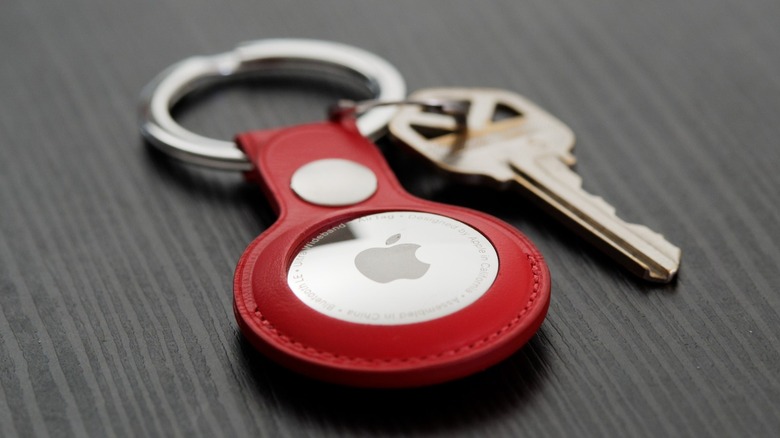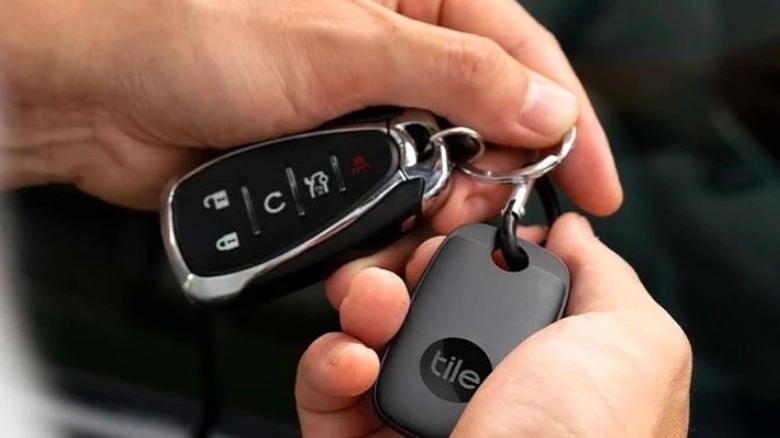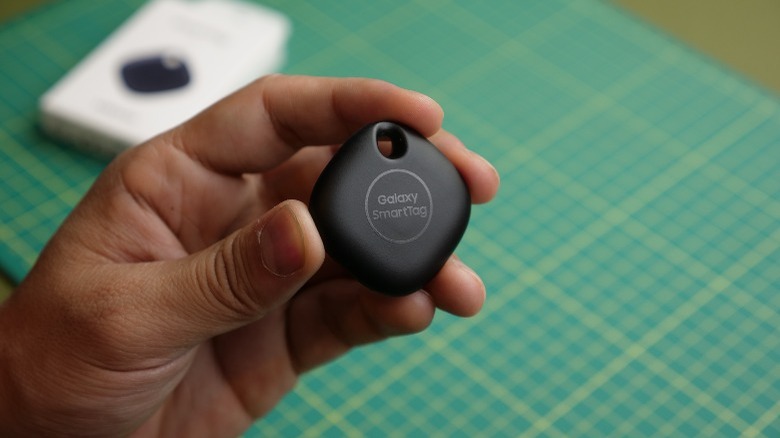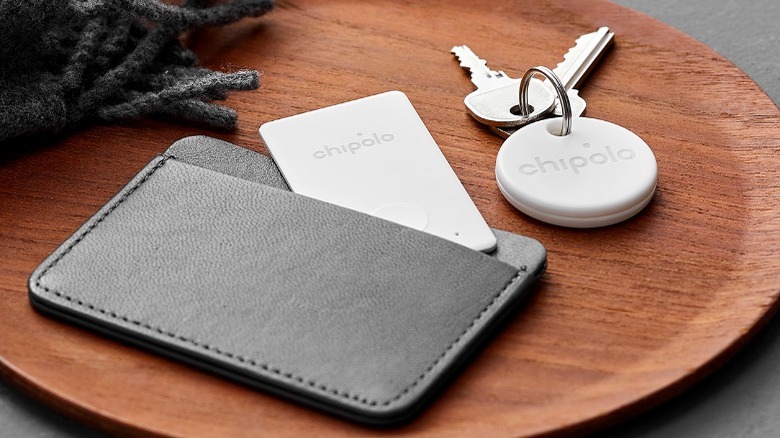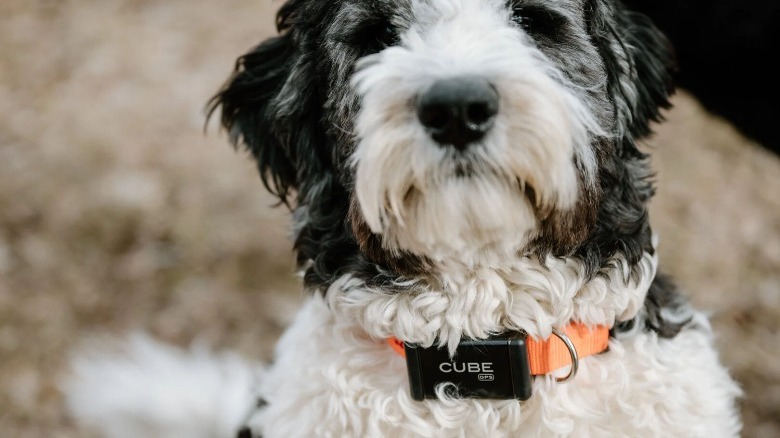The Best AirTag Alternatives For Android Phones
We may receive a commission on purchases made from links.
While Apple undeniably makes dependable, feature-rich tech products, the reliance of its products on the Apple ecosystem is often a deal-breaker for people who like to have a more diverse tech life. Case in point, Apple's AirTags largely refuse to work with anything that isn't an iPhone.
In case you were unaware, Apple AirTags work by using iPhones and other Apple devices on the Find My network as sort of a mesh network (via Apple). Simply put, devices like iPhones are equipped with a variety of sensors, including GPS sensors, that Apple can use to locate the device. AirTags — being very low-powered devices — emit BLE (Bluetooth Low Energy) pulses that allow nearby devices to pinpoint their location, and report that back to the Find My network.
Whether you refuse to use an iPhone because of the high prices, privacy concerns with Apple's Find My network, the dispute of Apple's approach to right-to-repair, or you simply like the variety and flexibility offered by alternatives, it's refreshing to know that there are options beyond just AirTags.
Tile
Tile is sort of a go-to GPS tracker for Android users. The trackers work on a similar principle to the Apple Find My network, except they exclusively use the Tile Network. While there have been privacy concerns since Tile's acquisition by Life360, according to Life360, you can disable sharing personal information to third parties. Tile has a large variety of trackers with different range specs, form factors, and batteries, so there's almost certainly one for every use case.
Tile offers both free and paid subscriptions to access the features in the tracking hardware. The free subscription tier offers Find Nearby, Find Far Away, and Find Your Phone, meaning you can find any Tile devices whether they're in Bluetooth range of your phone or not, as long as the tracker is within range of a networked device. If you want any of the fancier features like 30-day Location History, Smart Alerts, or Item Reimbursement, you'll have to shell out for one of two monthly subscriptions. A Premium subscription will set you back $2.99 per month, or $29.99 per year, while a Premium Protect subscription bumps up to $99.99 per year, with no monthly option. The only difference between the two paid tiers is the Item Reimbursement feature.
Item Reimbursement on Tile trackers sets them apart from the competition, acting as a sort of guarantee of quality and function. Tile is basically saying that if the tracker cannot be located, the company will replace whatever valuable item it was attached to up to a certain value. While the Premium tier only pays out $100 per unrecoverable item, the Premium Protect subscription pays out up to $1,000 per item.
Galaxy SmartTag and SmartTag+
With Samsung consistently occupying around 20% of the global smartphone market share, according to Counterpoint Research, it's safe to say that a Galaxy-exclusive GPS tracker that works on Samsung's SmartThings ecosystem is a good AirTag alternative. Similar to Apple's AirTags, SmartTags use nearby devices on the SmartThings and Galaxy Find networks to report their location to their owners, meaning Samsung's dominant Android market share helps make SmartTags far more practical for end-users.
The basic Samsung SmartTag costs $29.99 and functions only over BLE 5.1 technology, while the $39.99 SmartTag+ has added UWB (ultra-wide band) support that allows features like augmented reality support. Unfortunately, being dependent on the Galaxy Find network and Samsung's SmartThings means that both the regular SmartTag and the SmartTag+ are only compatible with Samsung Galaxy phones.
In true AirTag fashion, Samsung SmartTags also don't feature rechargeable batteries, instead relying on a replaceable CR2032 battery. Samsung's product page claims that the battery lasts up to 165 days on the SmartTag+, while the regular SmartTag boasts up to a year of battery life.
Chipolo
While not all of Chipolo's trackers work with Android — the Spot range is exclusive to Apple's Find My network instead — the regular Chipolo ONE and CARD work with the Chipolo app, which is available for both iOS and Android.
One handy feature of Chipolo's trackers is the Out of Range Alerts, which triggers a sound when you get out of range of an item in an attempt to curb your forgetfulness. While the Chipolo trackers don't have the long-range tracking capabilities of their Apple, Samsung, and Tile counterparts, the app updates the location of the lost device and will tell you where it was last seen. If it's in range, you can trigger a remarkably loud alarm — something that Tile only offers with a paid membership — to help you find it at close range.
Coming in at $25 for the ONE — which is the closest competitor to the Apple AirTag — and $30 for the wallet-optimized CARD, Chipolo trackers are a good alternative if you're mostly looking to keep track of your things within your own home.
Cube
Cube takes a different approach to tracking. While Cube offers limited-range Bluetooth trackers — in the form of the Cube Pro, Cube Shadow, and Cube Tracker — which operate similarly to those offered by Apple, Samsung, and Tile, it also sells GPS trackers for long-range applications. Instead of using a mesh network to locate the devices, Cube's GPS Tracker has built-in GPS and LTE hardware that allows for worldwide tracking, regardless of nearby networked devices. The obvious benefit of GPS is that there are no blind spots when there are no nearby devices to aid in tracking, while Wi-Fi, LTE, and Bluetooth connectivity help locate the device when GPS is not available.
Cube's regular trackers are priced between $24.95 and $39.95, with no subscription fee. The Cube GPS Tracker has an up-front cost of $29.95 including the SIM card, and the GPS Tracker requires a monthly or annual subscription. Cube's subscription for the GPS Tracker comes in at $198 per year, or $19.95 per month.
While expensive, the Cube GPS Tracker is a good alternative to the AirTag for specific use cases. The SOS button on the back of the device also makes it a good option if you're going into the wilderness for a while and need a reliable way to be found at the touch of a button. Battery life is a major downside, though. Although it's rechargeable, battery life on the Cube GPS Tracker is rated at 10-60 days, depending on usage and reporting.
